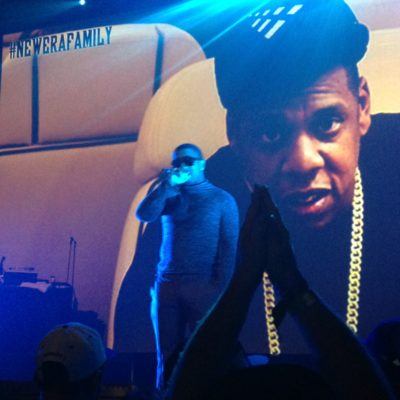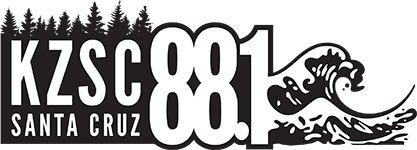
The morning began with a keynote address by Tony Visconti, a high profile record producer who has worked with countless artists. Visconti was extremely close to David Bowie, producing many of Bowie’s records, including the late artist’s final work, Blackstar. Visconti’s speech began with hilarious accounts from his past in the music industry. About halfway through his talk, the initial jubilance wore away, and Visconti began speaking on darker subjects. He read the audience a story he had written about the bleak existence of the industry’s future. However, he still called for optimism, acknowledging many newer acts, such as Sun Kil Moon, that continue to push boundaries and give him hope for new generations of talent, which he expressed in a concise adage “You don’t need to be psychic to be a prophet. You just need to follow the signs.” The story reflected experiences of Visconti’s past, and eventually brought the keynote speaker to tears as he alluded to the death of David Bowie. The ballroom cleared after a standing ovation.
I then attended an excellent panel titled “Nigeria’s Music Industry: Ready and Open for Business.” The panel included Ademola Ogundele and Ovie Ofugara, CEO and owner of Not Just Ok, a popular Nigerian music site, DJ Cuppy, artist and DJ, and Michael Ugwu, general manager for Sony Music West Africa. The conversation began by addressing how African music is often over-generalized by westerners as “Afro-Beat”, specifying that African music is far more complex and diverse than that title expresses. In explaining the structural differences between the Nigerian and American music industries, the speakers highlighted African music’s collaborative aspects that foster community and interaction between artists. One of the largest issues in Nigerian music is the piracy’s popularity as a method of distribution and consumption. Because of this, Nigerian artists and record labels have a lot of work ahead in creating and enforcing structures of distribution that bring more credit back to the authors of the music. The role of government in Nigeria’s music industry was also discussed, as well as music’s role as exportable culture. This led me to think about how media outlets abroad influence other country’s music industries.. We at KZSC are fanatics and consumers of many different foreign sub-genres of music; but how do we impact these foreign music industries?
Shay attended “Creative Convergence: Artists as Labels” which highlighted the pros and cons of being a self-releasing artist. Anna Vogelzang, an independent artist, spoke about the preparation that comes with self-releasing and engaging with Kickstarter and related funding sources. It has a high reward, as an artist can avoid signing contracts, but does mean that the artist has a lot more to push before the online campaign begins. What do you think? Would you be willing to support an artist who utilizes online funding as their main source?
In “Radio Re-tuned for the Multi-platform Ecosystem,” panelists touched on when to go to radio with new artists’ work. The end message: when you’re ready. However, from Shay’s point of view as the music director, it is always best to submit your work to college radio when you’ve reached a point of audience support that you’re comfortable with and feel your work is strong and relatable enough to garner a larger fan base.
In another radio-related panel, “How is Radio Shaping the New Entertain Me Button,” panelists Simon Cole, Larry Marcus, Nico Perez, and Kevin Stanley talked about the future of personalized radio. One prediction: voice interface in automobiles. This would be something similar to Siri, but in cars, so that individuals can request what song, artist or radio station they want to hear at any given moment. Is this a threat to traditional radio? Shay thought so, but given that one of the panelists had their start in college radio, and later founded Mixcloud, it could provide a hopeful future with public radio’s potential integration. They also highlighted the importance of podcasting as a means of archiving, so that listeners have an additional means of tuning in to their favorite programs.
Shay also sat in on “Goodbye to Your Tunes: Techs Race to Save Music.” Analog music lovers spoke about preserving music collections. Cheryl Pawelski of Omnivore Records suggested that the most important collections to preserve are the ones with the most impactful stories. Scott Goldman of the Grammy Foundation said what was on all of our minds: streaming services are not archives. Although the majority of people look to services like iTunes and Spotify for collections of music, these can often be changed and pulled as the music politics change. Andy Leach of the Rock and Roll Hall of Fame echoed this, suggesting that libraries are unable to provide access to such collections. This, in Shay’s opinion, is why college radio is essential: we are able to share rare collections with an audience. Pawelski suggested that re-releasing or debuting records on vinyl is a way of archiving, stepping away from the digital world into something physical. However, there is one main issue: the actual preservation of said wax. For how long can we maintain this method of listening to music?
Nikhil’s first panel of the day was a discussion of the newly premiered film Miles Ahead, directed and starring Don Cheadle, who also co-wrote the script with Steven Baigelman. The panel consisted of Cheadle, Robert Glasper, (who composed the original score), Keyon Harrold (who acts and pays trumpet in the film) Skip Livesay, (sound editor) producers Erin Davis and Vincent Wilburn Jr. (Miles’ youngest son and nephew) and Felix Contreras of NPR Music who hosted. A majority of the session was spent discussing the intricacies of capturing the music in the film, and the arduous process of paying homage to one of history’s greatest trumpet players. Each panelist echoed a sentiment of wanting to deliver a film that emoted “what it feels like to listen to Miles”, deciding that in their individual capacities they would strive to produce a similarly intoxicating experience. They didn’t want it to be a didactic retelling of his life, and instead focused on the relationships in his life that influenced his diverse output.
After the Radio…Entertain Me session, Nikhil headed to Can’t Tell Me Nothing: Independent Hip-Hop which boasted a panel consisting of Brandon Hixon, founder of We Make Music and manage of De La Soul, Amaechi Uzoigwe, manager of Run the Jewels, Naomi Zeichner, editor-in-chief of The Fader, and Hayley Rosenblum, head of music outreach for Kickstarter. They stressed the importance of building a relationship with your audience and avoiding the stagnancy of trying to figure out mass appeal, which is constantly in flux. Often times they’ll give their music away for free and make most of their income off of ticket sales, merch, and fans serious enough to pay for the music even when given the option not to. What they underscored is having a dedication in your work ethic, for in time, passion and focus can perfect any product. Zeichner and Rosenblum discussed the need to keep an ear to the ground, which means being active on Twitter, speaking to friends whose taste are aligned with your own, and keeping an ear to your local scene just as often as you do for musicians getting national recognition. They were in consensus that at the end of the day, fans drive everything, and that the artistry of music is a constant process of giving back.
Chelsea went to a panel called “24/7/365 Promotion and the Always-On Artist”, which spoke about how having a small roster avoids problems with cycles of artist promotion. This entails a focus on making the music the best that it can be, before trying to market the artist. With a 5 year plan in mind, it is difficult to make a cookie cutter market plan, but easier to think about what the band wants to accomplish. Ask the artist what they want to say and how they want to promote themselves –quality over quantity– don’t make music to fill a schedule. The idea of using social media for instant feedback can be discouraging, so they advised not to rely on public feedback for art: make art for yourself, if others enjoy it, view that as a bonus.
The next panel that Chelsea went to was “She Who Goes First Sets The Rules: Women Innovators,” which focused on how women should rebuild the entire music industry infrastructure to fit women exactly as they are. Women shouldn’t have to be more masculine to be taken more seriously, but instead they should be able to write their own rules. They then discussed how there are often few women on festival lineups, and furthermore, how of Billboard’s 100 Most Powerful Influential Executives in the Music Business, only fifteen were women. Women, however, are arguably better than men at certain jobs because some women can be more in touch with their emotions, or empathetic, which makes them more valuable in understanding what consumers need.
Thursday night’s musical showcases were the bee’s knees… but the evening coincided with Texas’ celebration of the late Saint Padrick. Thus, alcohol-fueled crowds were piling into venues. We were able to catch Loretta Lynn, who at 83 years old performed with enough sass to make Beyonce proud. Cocorosie played in an interesting showcase located inside a Presbyterian Church, creating awe-inspiring sonic acoustics. Other great acts we caught were Faith Healer, Mitski, Lionlimb, Lapsley, Lissie, L.E.J, La Luz, Shannon and the Clams, Nef the Pharaoh, Divine Council, Nick Grant, DOOMSTARKS (MF Doom and Ghostface Killah), and Lil B.

